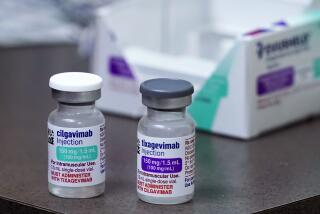Avastin: What is it?
- Share via
The Food and Drug Administration has announced that it is revoking approval for the cancer drug Avastin for treatment of breast cancer. Here are some facts about the drug.
What is Avastin?
Avastin (bevacizumab) is a so-called biological therapy and the first drug approved by the FDA that was designed to inhibit growth of blood vessels feeding tumors.
Who makes it?
Avastin is made by the biotechnology company Genentech, headquartered in South San Francisco.
How does Avastin work?
It is an antibody that binds to a protein called vascular endothelial growth factor A (VEGF-A), important for blood vessel growth. A so-called anti-angiongenesis drug, it is designed to kill or shrink tumors by starving them of their blood supply so they can’t receive the nutrients they need. Tumors over-produce VEGF, stimulating blood vessels to grow and nourish them.
This anti-angiogensis approach was pioneered by the late Judah Folkman, a Harvard surgeon, who died in 2008. As this Los Angeles Times obituary explains, Folkman “reasoned that tumors could grow beyond a small size only if they stimulated the growth of new blood vessels to supply their cells with nutrients and oxygen, a process called angiogenesis. The logical outgrowth of that reasoning was that blocking the recruitment of new blood vessels could starve tumors into submission, converting cancer into a manageable, chronic disease.”
The obituary also noted that Folkman’s ideas were not taken seriously for a very long time but that today there are at least 10 antiangiogenesis drugs on the market and about 50 more in development.
What else is Avastin approved to treat?
It’s still approved for treatment of metastatic colorectal cancer, advanced non-small cell lung cancer, glioblastoma if it’s spread after earlier treatments, and metastatic kidney cancer. The situations in which it would be used for those cancers is different in each case. (Read more at www.avastin.com).
Does the FDA’s decision affect the use of Avastin for those other kinds of cancer?
No, those aren’t changed.
Why did the FDA decide to revoke approval for breast cancer cases?
The FDA decision doesn’t come out of the blue. There was always some question about whether Avastin prolonged the survival of people with metastatic breast cancer. Eventually, studies showed that while Avastin helps tumors stop growing for a time, it doesn’t lengthen the patient’s life. In addition, harsh side effects are linked to its use.
The drug was approved in 2008 for treating breast cancer via an accelerated review process that was subject to further study, even though an advisory panel had earlier recommended 5-4 that the drug not be approved. The FDA often follows the advice of advisory panels but does not always.
In July 2010, an advisory commitee recommended that approval for breast cancer treatment be withdrawn after new trials showed no survival benefit. In December of that year, the FDA moved to withdraw Avastin for that use; Genentech challenged the move. The advisory panel voted 6-0 to revoke Avastin in June after two days of testimony that included impassioned pleas from some patients to keep it available.
That brings us up to now, and the FDA’s decision to revoke approval of the drug for breast cancer patients.
What are the side effects?
About 1% of breast-cancer patients taking Avastin died from side effects. The drug can cause strokes and heart attacks and can contribute to congestive heart failure.
Are some women helped by Avastin? Why can’t they still get it?
Some researchers believe that certain subsets of women are helped by Avastin. In particular, patients with a type of breast called triple negative, which is an aggressive form of the disease, may benefit from Avastin. Further studies are needed to clarify that issue, however. Doctors can still prescribe Avastin to breast-cancer patients off-label, but it is unlikely insurers will cover it.
More to Read
Sign up for Essential California
The most important California stories and recommendations in your inbox every morning.
You may occasionally receive promotional content from the Los Angeles Times.










